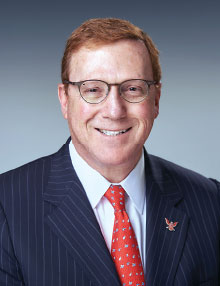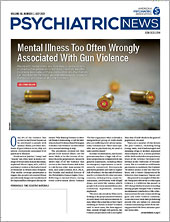“We are all in this together, and together we will emerge stronger for the trials we have endured.”
So said
APA CEO and Medical Director Saul Levin, M.D., M.P.A., at the Opening Session at APA’s online 2021 Annual Meeting, capping an unprecedented year of challenges. Levin used his address to thank APA leaders, including outgoing President Jeffrey Geller, M.D., M.P.H., the Board of Trustees, and the APA administration for working through a truly exceptional year.
“Last year we saw tremendous challenges in the form of the COVID-19 pandemic and the palpable impact of structural racism on our society,” Levin said. “This has been a test for us to examine ourselves, our organization, and our community and to determine how to improve. These challenges have demonstrated that our work as experts in the mind, body, and brain is more vital now than ever before.
“Psychiatrists across the country and across the globe have risen to meet the challenges of the COVID era and have continued to deliver high-quality care to patients through the innovative use of technology, as well as old-fashioned dedication and passion to our patients and profession. Members stepped up and endeavored to meet the growing demand for psychiatric services, and our COVID task force compiled and created scores of resources that our members and psychiatrists have made use of as we adapted.”
Levin took special note of psychiatrists who, in the early days of the pandemic in New York and elsewhere, pitched in to help on medical units. “I will take a moment of appreciation for the frontline psychiatrists, from medical students to residents to faculty, and to those who changed their practices to telepsychiatry to ensure their patients could continue with their treatment. In this time, more than ever, you showed that we are physicians first alongside our house of medicine colleagues,” Levin said. “We deeply mourn those members, and some of their families, that we lost to COVID-19.”
The national racial reckoning that began after the murder of George Floyd in Minneapolis last year left its mark on medicine, including psychiatry, and the American health care system. “COVID-19 ripped the Band-Aid off historical inequities, exposing the impacts of structural racism on the mental and physical health of racial and ethnic minorities,” Levin said. “This was compounded by events including police killings and mass shootings in Atlanta and Boulder, Colo. We have spoken up as psychiatry to point attention to the existence and pervasiveness of structural racism, to say Black lives matter, and to stop Asian and Pacific Islander hate.”
Much remains to be done, he said. “The efforts of so many of our leaders, our members, and our administration showed that we can look toward an anti-racist, inclusive, and equitable future for our profession and our patients. We listened to members, and the Board and I both worked with experts in that area. It took and will take hard work and changes to our outlooks and to our policies and procedures.”
Levin cited two important reasons for optimism arising from last year: the growth of
PsychPRO, APA’s mental health registry, and the dramatic jump in the number of
medical school students choosing psychiatry in this year’s National Resident Matching Program. He noted that the registry is garnering new members and health systems, allowing the registry to collect data on neuropsychiatric symptoms of COVID-19.
Levin concluded: “As we carry burdens of the past year and continue to seek to help others, it will be important to get help where we need it, but also to mind our words—spoken and written—and communicate with empathy, thoughtfulness, and professionalism, even when we disagree.
“Let us look to the future and the continuation of the work of our oldest national medical society in the U.S., the American Psychiatric Association.” ■

